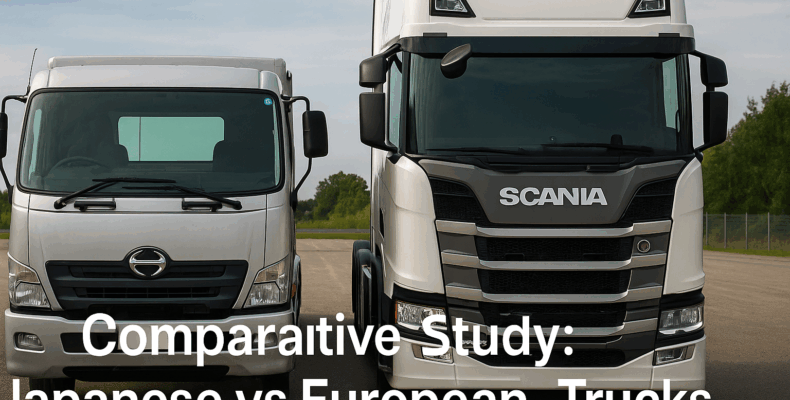Comparative Study: Japanese vs European Trucks
Choosing the Right Truck for Your Business—A Practical Guide for Importers
When it comes to buying trucks for logistics, agriculture, or construction, importers often ask:
“Should I choose a Japanese or a European truck?”
Both regions produce world-class vehicles. However, their strengths differ. This guide compares the two, based on real-world performance, maintenance, and resale value—so you can make the best choice for your market.
1. Reliability: Which One Lasts Longer?
Japanese trucks are famous for their durability and consistency. Brands like Isuzu, Hino, Toyota, and Mitsubishi Fuso are known for trucks that run smoothly even after 10 years of use.
On the other hand, European trucks (such as Mercedes-Benz, Scania, and MAN) offer advanced technology and driver comfort, but often require more complex maintenance.
✅ Verdict: If long-term reliability with less downtime matters, Japanese trucks win.
2. Maintenance: Easy to Repair or Complicated Systems?
In most emerging markets, access to parts and qualified mechanics is limited. Japanese trucks are easy to maintain due to:
-
Simple mechanical design
-
Wide availability of spare parts
-
Lower cost of repairs
European trucks often need specialized tools and diagnostics, which can delay service and increase costs.
✅ Verdict: Japanese trucks are better for areas with limited service infrastructure.
3. Fuel Efficiency: Saving Every Mile
Japanese trucks are built with fuel economy in mind, especially for light and medium-duty models like the Isuzu Elf and Toyota Dyna. They perform efficiently on both highways and local roads.
European trucks can be fuel efficient, but they often run larger engines and are optimized for long-distance freight across Europe’s high-speed roads.
✅ Verdict: For urban or mixed-use transport, Japanese trucks save more fuel.
4. Cost: Upfront and Long-Term
Japanese used trucks are typically more affordable to purchase and operate. You can often find high-quality units at auction or through trusted exporters with good maintenance history.
European trucks are more expensive upfront, and their long-term ownership costs are higher due to parts pricing and fuel consumption.
✅ Verdict: Japanese trucks offer better return on investment (ROI) for most small to mid-size fleets.
5. Resale Value and Global Demand
Japanese trucks maintain value well. Because they are recognized worldwide for reliability, many buyers are willing to pay good prices for them—even after years of use.
European trucks do hold value in some regions, especially where parts and service networks exist. However, their resale market is not as consistent in developing countries.
✅ Verdict: Japanese trucks offer stronger resale prospects in international markets.
6. Where to Buy: Trust Matters
No matter which truck you choose, a reliable exporter is essential. Many importers trust Japan-based companies that provide:
-
Full inspection reports
-
Export documentation
-
Shipping and clearing assistance
-
After-sales support
For your convenience, here’s a guide to the most recommended exporters:
👉 Top 5 Trusted Japanese Used Truck Exporters for Global Buyers
These companies are known for honest service, good stock, and strong global reputations.
7. Which Should You Choose? A Quick Overview
| Criteria | Japanese Trucks | European Trucks |
|---|---|---|
| Reliability | ✅ Proven to last long | ⚠️ High quality but complex |
| Maintenance | ✅ Easy and affordable | ⚠️ More tools and costlier |
| Fuel Efficiency | ✅ Excellent for short/medium routes | ⚠️ Best on highways |
| Purchase Cost | ✅ Lower upfront cost | ⚠️ Higher purchase price |
| Resale Value | ✅ Strong demand globally | ⚠️ Market-specific resale |
8. Final Thoughts: Which One Is Right for You?
If you want lower costs, reliable performance, and easy maintenance, Japanese trucks are often the smarter choice. For importers in Africa, the Caribbean, Southeast Asia, and the Pacific Islands, this decision has helped grow successful logistics businesses.
However, if you operate in an area with full access to European parts and support, and your work demands top-tier cab comfort or advanced tech, a European truck might be a solid option.
But remember—whichever you choose, make sure to work with exporters you can trust:
👉 Top 5 Recommended Japanese Used Truck Exporters
They’ll guide you through the buying process and help you avoid costly mistakes.
